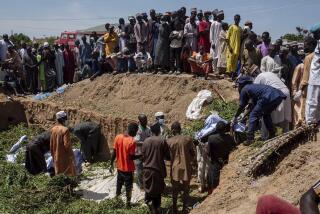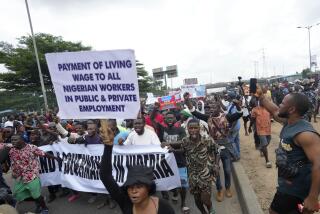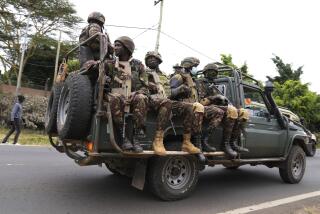Riot Police and Protesters Clash Again in Nigeria
- Share via
ABUJA, Nigeria — Police firing tear gas battled demonstrators in this capital Tuesday in a second day of violent protests that have left eight people dead.
A general strike over fuel price increases kept seaports, banks, shops and gas stations closed in the world’s eighth- largest oil exporter, raising fears of a prolonged walkout that could affect exports of Nigeria’s mainstay crude oil.
The strike, set to continue today, pushed up the price of oil on international markets even before the senior oil workers union, Pengassan, said Nigeria could face a total shutdown of its oil industry if the strike was not resolved by Sunday.
Manufacturing is at a standstill, at heavy cost to some of the country’s leading companies.
A union leader said that talks between the government and the umbrella Nigeria Labor Congress ended without agreement Tuesday and that the stoppage would continue.
“The progress so far is sufficient for us to continue with discussions,” NLC leader Adams Oshiomhole said. “But for now we have agreed to disagree.... We are reconvening tomorrow.”
Tuesday’s talks were delayed after riot police fired tear gas at picketing union leaders.
Oshiomhole sought refuge in a government office as tear gas engulfed the complex housing federal government departments here.
Hundreds of chanting civil servants, hurling insults at police, escorted him to his car.
Oshiomhole later sent a protest letter to the national police chief condemning the “massive and indiscriminate use of live ammunition and tear gas” by police.
Officers in heavy body armor stormed picket lines after NLC supporters blocked the main entrance to federal offices.
A police spokesman said four people were shot during “an encounter with the police” in a suburb of Abuja, which saw fierce skirmishes between authorities and protesters Monday.
Four people died in Lagos, Nigeria’s commercial capital, when a speeding vehicle crashed into a group of demonstrators, police said.
Major oil firms say they could maintain production for a couple of weeks even if the strike persists beyond the weekend. But they have no control over junior staff at loading terminals whose unions back the strike.
Nigeria exports more than 2 million barrels of crude a day.
President Olusegun Obasanjo, who wants to end subsidies on imported oil products, raised the price of gasoline, kerosene and diesel by 50% on June 20.
The price of a gallon of gasoline jumped from about 80 cents to $1.25. Union leaders cite the low price as one of the few benefits for the impoverished population.
More to Read
Sign up for Essential California
The most important California stories and recommendations in your inbox every morning.
You may occasionally receive promotional content from the Los Angeles Times.










